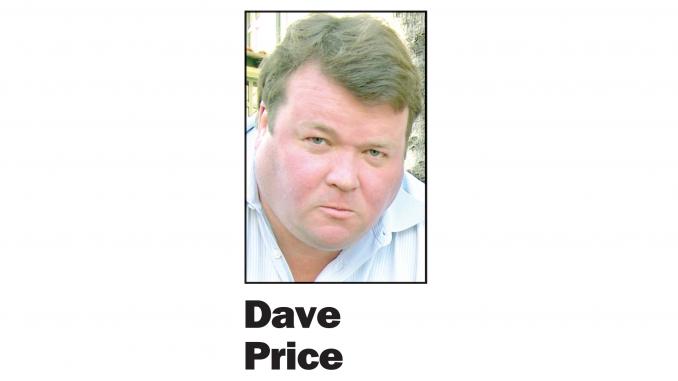
OPINION
BY DAVE PRICE
Daily Post Editor
How far should a newspaper go when it comes to reporting the profanity-laden rant of Anthony Scaramucci, the incoming White House communications director?
That was the thought-provoking question I was facing on Thursday afternoon after Scaramucci’s obscene and graphic rant hit the news.
What Scaramucci said in his interview with The New Yorker was newsworthy. It provided a glimpse into the Trump White House and vividly illustrated the infighting between different factions. It also foreshadowed the departure of chief of staff Reince Priebus the next day.
But to get the entire sense of what he was saying, you could argue that the story needed to relate his full quotes, complete with expletives and anatomical references.
Asterisks versus dashes
Some of you probably felt I copped out. I didn’t use the more graphic illustrations Scaramuccci gave — like his description of chief strategist Steve Bannon’s self-love. I kept the obscenity out of the story, replacing foul language with the first letter of the word followed by a series of asterisks, like when Scaramucci called Priebus a “f****** paranoid schizophrenic.”
I like asterisks instead of dashes because dashes tend to run together and the reader can’t figure out how many letters long the word was. I know one editor who would follow the first letter with the symbols you find on the keyboard’s top row: @#$%^&. That gives it a comic book effect, which is good if it’s a humorous story.
But Scaramucci’s rant wasn’t funny. I think the White House “communications director,” whose job it is to get the president’s message out to the nation and the world, exercised such poor judgment in what he knew was an on-the-record interview. Scaramucci laughed it off as a rookie mistake, but that’s not the job for a rookie.
I left out the obscenity, however, because the Daily Post is truly a paper read by people of all ages. I see teenagers picking up the paper all the time, and I frequently get emails or calls from young people with questions about stories. The conventional wisdom in publishing is that newspapers are read mostly by older people, but I suspect the Daily Post is an exception.
Setting a bad example
And if we reach young people, we need to watch our language. I don’t cuss as much as I used to because I’ve got a 13-year-old at home, and kids copy what their parents say.
Other editors saw it differently. At The New York Times, executive editor Dean Baquet concluded that it was newsworthy that a top Trump aide would use such language, and the paper’s readers shouldn’t have to search elsewhere to find out what he said.
To me, that’s a silly argument. If the Times were doing a story on pornography, would he put an adult video on its website so people wouldn’t have to search elsewhere?
The Washington Post published the expletives Scramucci used, but avoided the descriptor of self-love he offered about Bannon.
“Generally we don’t publish these words in full, but when they come from the highest-level government officials in the performance of their jobs, we believe an exception can be warranted,” said Kris Coratti, spokeswoman for the Washington Post. “We felt it was warranted in this instance.”
On TV, it was fun to watch the anchors try to avoid the obscenity. MSNBC’s Rachel Maddow said Scaramucci’s reference to Bannon suggested that he “performs an anatomically difficult but not impossible act of a kind that suggests he is more interested in serving his own self than the president.”
On CBS, White House correspondent Major Garrett said Scaramucci used language “more fit for the outhouse than the White House.” Garrett quoted the phrases Scaramucci used to describe both Priebus and Bannon, but replaced obscenities with word “expletive.”
Hearing the word “expletive” brings me back to when I was a kid and President Nixon’s White House tapes were released as transcripts in 1973. The transcripts, printed in the newspaper and in book form, had the phrase “expletive deleted” over and over again.
What I heard people talking about wasn’t that the tapes showed Nixon was trying to cover up the Watergate burglary. No, people were shocked by Nixon’s language and the repeated use of the term “expletive deleted.”
My mom and her friends were aghast that the president was such a potty mouth. My dad’s take was different. He said this is how men talk when women aren’t around.
Does it help tell the story?
It’s a judgment call as to when a reporter should quote somebody who utters an expletive, even if it’s only going to be printed with the first letter followed by a series of dashes or asterisks.
Many years ago I was interviewing a priest, and he let the s-word slip. I looked up from my notepad and said, “Say 10 Hail Marys.” We both laughed. I didn’t print it. Using the word wouldn’t help people understand the story any better.
And that’s the question. Does the use of an objectionable word help tell the story? Or is it so jarring to see such a word in print that it distracts from the story?
• • •
How to stop road diets
For drivers who are frustrated with road diets — where lanes of traffic are eliminated to install bike lanes or assuage vocal neighbors — a remarkable story happened the other day in Los Angeles.
The city actually said it would remove nine miles of a road diet in the Vista del Mar and Playa del Rey neighborhoods.
It’s rare for a city to back down on a road diet. But this road diet met with a lot of opposition. It caused traffic backups and reduced sales at businesses along the routes that lost street lanes.
People struck back. A homeowner association filed a lawsuit and residents launched a recall campaign against the councilman, Mike Bonin, who pushed for the road diet. Radio stations jumped in. They did live remotes from the backups, interviewing angry motorists and drivers while horns honked in the background.
On Thursday, Bonin caved and announced the city would be returning the streets back to the way they were before.
The combination of a lawsuit and a recall campaign appears to have done the trick.
That’s something mid-Peninsula residents might keep in mind the next time a city or county government springs a road diet on them.
Editor Dave Price’s column appears on Mondays. His email address is [email protected].



